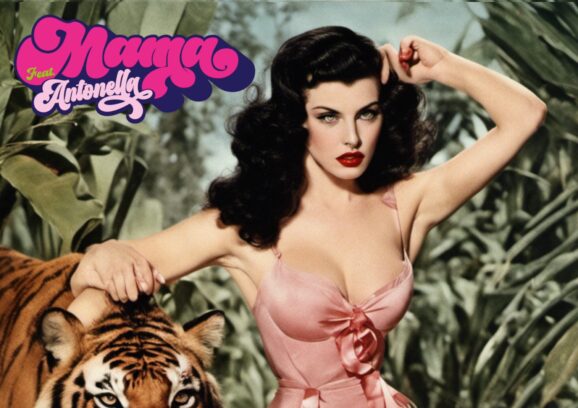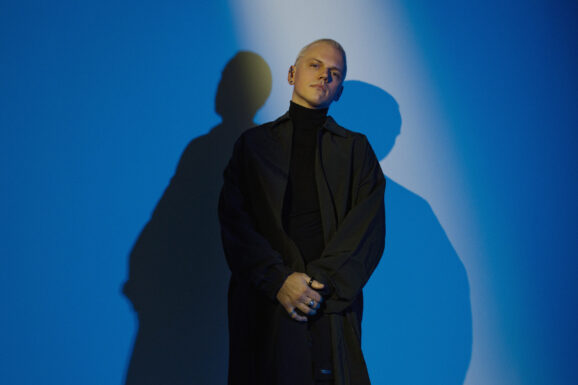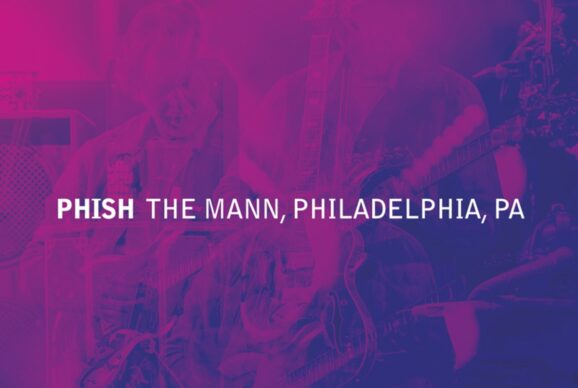When she first started out, Katie Herzig was a guitar-slinging folk singer crafting heartfelt melodies filled with equal parts melancholy and optimism. Flash forward 10 years and, while the sentiments remain largely the same, the soundscapes in which they live have been altered dramatically. Pulsing drum loops, soaring synthesizers, and fuzzy bass lines provide the foundation for Herzig’s latest effort, Walk Through Walls. It’s a complex and cathartic set that fully delivers on the promise made by her previous offerings and it begs the question, “Where do you go from here?”
Describe your artistic evolution from folk singer to electro-pop maven.
It’s been a very natural evolution that is following what kind of tools I have around me to create with, mixed with what I’m influenced by, so it’s definitely gone away from the singer/songwriter acoustic thing just because of the influences and tools I have. From the beginning, though, I was way into layering and production and all that. It just gets out of hand the longer I go.
You’re one of those solo artists that could have a band name to make it seem like something bigger, but you don’t do that.
No. Much to my regret. It’s interesting because, in hindsight, I probably would have done that because I feel like it would be — if I had a cool band name — it would invite people into listening to my music that might dig it more than if they heard I was a female solo artist. Which, I think there are a lot of female solo artists who break that mold. Some of them have the cool band name, some of them have their own name. In Interview magazine, when I was mentioned in the company of Sia, Robyn, and Ellie Goulding, I was like, “Oh, okay. Well, this is my inspiration more than the singer/songwriters I would often be grouped with.”
But they didn’t group you with Bon Iver and Aqualung…
Men?
Well, yeah, but solo artists who use band names.
That’s true. You know, after I went to South by Southwest, I thought, “Man, if I had a cool band name, the Pitchforks of the world would be like, ‘Oh, who’s this?’”
You listen to a lot of bands. And you seem to listen with a producer’s ear, almost more than a songwriter or artist’s. How does that work?
A lot of times the last thing to reach me are lyrics and so a lot of it is just my connection with the feel. Some of my favorite songs, I have no idea what the lyrics say. That’s definitely how I’m listening. When I can dig into the lyrics and they come alive or if I relate to them, it’s good. But I don’t have to have lyrics making complete sense for me to love a song.
How is your creative process different now that you’re working in a more electronic realm? How does a song come together for you?
Whereas I used to start with an acoustic guitar, none of my new album started there. It either started on the bass or with a drum loop or sound that I liked, or with a keyboard sound that I liked. Over the last couple of albums, I’ve written songs as I’ve created the landscapes that they’re in. It’s not separate. The production and the songwriting are very much combined.
So, as you’re building tracks, the song is coming together. Lyrics and all?
Yeah. And a lot of times, more often than not, I get too into building the track before I have all the lyrics. So, dummy lyrics often are in there for a while, or I cut and paste a verse in there twice and, months down the road, I need to write another verse.
So, really, there could be a lyric-less DJ project in your future.
There could be. I love writing lyrics, though. I’m a writer and I love expressing myself in that way. So, for as much as they seem to not have as huge a weight to me as to other artists, when I’m creating, that part of the process is one of my favorite puzzles and expressions.
Your mom passed away right as you were starting to tour with The Waking Sleep. Grief is a wide and mysterious storm. That must have affected everything that came after for you, no?
Yeah. Totally. It’s in the weight of every song of this album. I didn’t really write for a long time until I was able to write about that because my ability to write without falling apart emotionally was so restricted unless I let myself go there and record that process. That was the hump I had to get over. And there are still some of these songs where I don’t know how I’m going to do them live. I can, for sure, not do some of these songs live in front of my family. That’s where I usually lose it the most. It’s a huge influence on the record.
“Forgiveness” was the breakthrough track, right?
Yeah.
So you get through that and, somewhere in the middle of that storm, you made your way to a clearing — where you began a new relationship and this new record. How did those experiences inform each other?
Kind of in the same way that they have before, it just happened to be a season of extreme loss and extreme newness — all these really deep, new experiences. So, I was never at a loss for expression. There was always something very close to the surface for me. When people ask what my record’s about, or what are the themes, I usually describe it as having three things: the loss, the love, and my concern about the world, be it climate change stuff or just the state of things I see. So those things, I always kind of mix together. Could be in one song.
There’s always a lot of self-reflection in your writing — examining the bookends of hope and fear, love and loss. They come in pairs as you work through them. And those themes continue on Walk Through Walls. Have you learned new things about those concepts over the past few years or about yourself in relation to those concepts?
Totally. Yeah, those are kind of go-tos, I guess, in terms of universal things. I think I just experienced it in a very tangible way that brought me to a place of total self-evaluation. I think the greatest piece in all that was surviving all those things that I always feared. Inevitable growth.
Now that you’re on the other side of it, do you feel as though you lean toward one side more than the other — say, hope more than fear? Or is it always a dance between the two?
It’s a dance for me, because it kind of just depends on the day and on my stress level. I lived in a really protected, idealized time in writing this album, so my personal growth was really savored and expressed. It wasn’t easy. It was hard growth, too. And I’ve noticed that, as I’m getting back in the world of putting stuff out there…
…including yourself.
Yeah! Those things can seep in, too, whether I’m erring on the side of hope or fear.
The album wants and warrants full participation from the listener to really get the most out of the experience. It’s not just an easy, background listen. It’s dense and layered, but incredibly cathartic if you take the whole ride. Does that reflect your experience of making it?
I wanted it to. It’s interesting that the songs that began the whole process are a little more buried in the album, like “Water Fear” and “Forgiveness.” And they are kind of where it ends, a little bit. It’s never a perfect package, whatever you create. I’ve always noticed that there’s so much potential when you start something, and so much hope for whatever it is. And, in the end, you’re just like, “Well, this is what happened.” Almost without my planning, I just followed whatever I had to get out and whatever inspired me. In terms of it being a cathartic journey, those were pieces along the way that tell the tale.
Your whole career has been as an independent artist. You worked with a small label on The Waking Sleep, but you’re back on your own this time. What — if anything — would a label bring to the table for you? And do you think the potential sacrifice of control would be worth it?
My experience with the label world… I’ve never been entered into a deal ahead of creating something so, in terms of having creative control, I can’t imagine that I would ever give anyone the ability to say yes or no we won’t put this out. I would probably make my own thing. I feel like I’ve been lucky because I have never been offered something that I couldn’t refuse or that compromised that for me. But, I don’t know, after releasing an album with a label last time and now doing it alone, there are things I see that they really did help with. But a lot of that is front-end stuff because I think whoever’s going to be out there running the marathon is just me. And, so, I like the idea that I have that in my hands this time because, from what I know of labels, they are very fickle, they are very front-end. Not all of them. There are some good ones out there, I’m sure. But they’re kind of becoming like banks, really, that hire out the pieces…
…with high-interest loans.
With high-interest loans. Yes. And I didn’t feel like I wanted to do that again, but I also feel a little more of the financial risk this time, more so than I did last time.
Still, even on your own, you’ve done very well over the past few years with film and TV placements. How does that revenue stream determine your approach to the intersection of creativity and commerce? Or does it? It must always be in your head.
Yeah. I won’t deny it’s in my head. But it’s usually in times when I’m creating something and it’s good, and I feel it’s good, and I’m like, “Oh, this could be user-friendly.” But it’s usually not me chasing that down. And, I mean, I got finished with this record and had all sorts of like, “Katie, you didn’t create any songs that are obvious for radio or anything.” I just don’t approach things that way. But it’s a reality. Having most of my income come from placements, I’m aware of that stuff, but I haven’t created anything that’s perfect for that either.
With the ever-shifting music industry landscape, what does an artist like you do to keep it all on track, to make it sustainable for the long haul because you have an admirable career?
Pretty much every artist I know is always searching for more, for growth in some way, and sustainability mostly. I think growth is really related to sustainability. We don’t have sustainability because it’s not inherent in artists’ lives to have that — there’s so much unknown. I’m aware of that, for sure. The only thing that gives me comfort and that I keep coming back to is if I keep creating stuff that I love and that has a high quality to it — that’s the only thing I can count on to lead to, hopefully, streams of income.
It’s the only thing really in your control.
It is the only thing in your control, especially when it comes to music placements. I’m very aware that those aren’t sustainable things.
Is touring, in this day and age — externally and internally — is that a long-term strategy?
My touring strategy is to invest a little bit more in being able to — hopefully, eventually — have it be a source of income. It’s not. When I tour with a band right now, I’m just spending money. But, I’m kind of at that level which… there are bands who crossover and you can make good money touring.
You’re probably right at the tipping point, wouldn’t you say?
Yeah. Some nights are good; some nights aren’t. It depends on the market.
Where do you go from here, artistically speaking? And how does your expanding reach as a producer of other artists factor into the scheme of things?
I’d like to do more producing of other artists. All those have been really natural things, nothing I’ve really sought to do yet and grow. But, as I get further along in my career and grow, I can see those things as being things I could be good at and interested in.
You think you could be good at? You’re pretty good at producing already.
Ha! Well, I produce my own records. But I would say, as an artist who does my own thing, I can’t just… I have to love what I’m working on. I have to feel really into it. But, I imagine I’ll keep creating my own music because it’s my expression and my craft of life.
Where do you go musically from here, though? From where you’ve been to where you are…
That’s a mystery to me. I’ve often felt that’s a question for a lot of artists who start out really acoustic and make their way out of that. I think everything is cyclical. You’ll probably come back to some of that and you’ll try new things from what’s in the future… I don’t know. I can only imagine it’s just following the muse of inspiration.
For more information, visit Katie Herzig’s website.
Katie can also be followed on Twitter and Facebook.











3 Responses